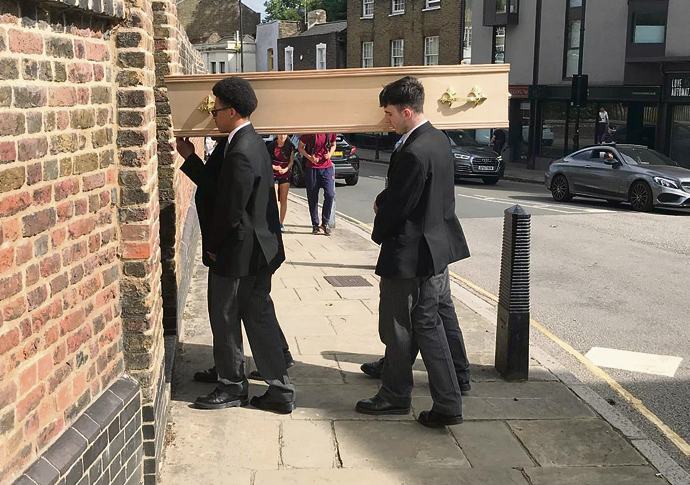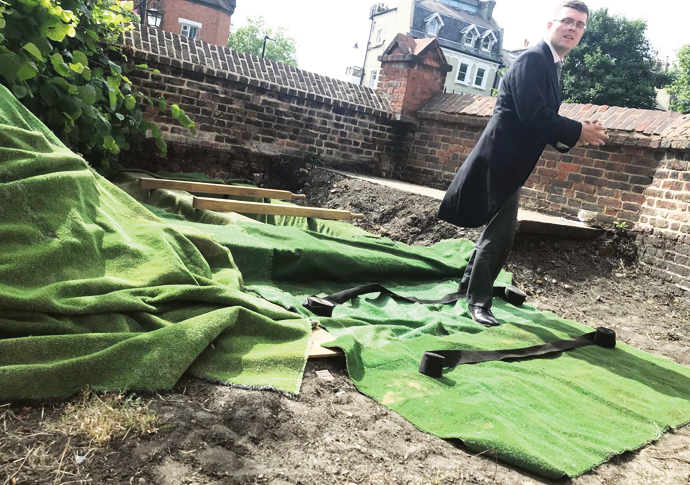Skeleton in school cupboard
Prestigious school holds burial for 200-year-old bones from biology lab
Friday, 4th July 2025 — By Tom Foot

Priests in vestments lead the way as the coffin of the unknown woman was brought out of Highgate School and taken to the adjacent graveyard
A PRESTIGIOUS private school has held a burial ceremony for a 200-year-old skeleton it kept in its biology department.
The remains of a woman, described as a “non-European skeleton” was given the full funeral service by Highgate School, the fee-paying secondary in Highgate village on Thursday.
Investigations have found she was most likely Indian aged 20-45 who died from cancer or diabetes. There was evidence of terrible tooth decay.
The Tribune watched as a small wooden coffin was carried into the school’s grounds in North Road in a procession led by headteacher Adam Pettitt.
Our reporters were told they could not attend the private ceremony, but the muffled sound of children playing musical instruments and the reading of Christian rites could be heard from beyond a perimeter wall.
“We entrust our sister to your people in the name of Jesus, our lord,” a robed priest said.
The school said representatives from several faiths had been invited to attend but that no relatives could be contacted. There are no records of who she was or how she came to be in its biology department, the school said.
Highgate School, which has not been accused of any wrongdoing, is understood to have spent three years negotiating with various authorities before the funeral could take place in the adjacent churchyard.

It comes amid calls on the government for reforms to help institutions find dignified solutions to historic human remains previously held for educational purposes.
Human skeletons have been used in schools and universities for decades but there is no register of provenance and a licence is not required if more than 100 years had passed since death.
Changes in the law have prevented the public display of “relevant material” from a deceased person, leading to many schools like Highgate putting skeletons and bones into boxes in storage. Skeletons have been replaced generally by plastic ones since the 1960s.
A trade in human bones from colonial countries dates back to a dark era of British history where indigenous people’s graves were often looted for sale on an open market.
Sources close to Highgate School said that the skeleton had been put into storage after being on display for decades in the biology department.
“Initially there was a plan to cremate the bones but this was not allowed,” a source said. “It couldn’t be displayed, it couldn’t be sold or destroyed. So what were they supposed to do? The autopsy showed that the bones belonged to a woman who most likely died from cancer. She had massive decay on her teeth. The bone structure showed that her weight was believed to be 53 kilos, which is hardly anything.”

Former school alumni have told the Tribune that it was widely known among pupils that human bones were held in boxes in the corridors.
The headteacher Mr Pettitt was unavailable for comment, but a Highgate School spokesperson said: “The skeleton has been in our biology department for some time, but there are no available local or archive records to clarify the origin of the skeleton or their next of kin.
“Following an osteo-archaeology report, we believe the skeleton is that of a non-European woman who died between the ages of 20-45, probably of cancer or a metabolic disorder. We have followed national guidance by consulting with the local authority, London Diocesan Registrar and other local representatives and have received a formal burial notice.
“In order to ensure we treat the deceased with dignity and respect, we invited representatives of different faiths to the interment.
“We received a coroner’s order for burial from North London Coroner Service, signed on May 2 2025.”
The dark secret in science departments
A LABOUR peer says “urgent” reforms are needed over the ownership of human remains, writes Tom Foot.
Lord Paul Boateng, who led a debate in the House of Lords in March, said a “shaming historic neglect of basic human dignity” was ongoing in this country. His debate had heard how the continued storage of bones in schools and museums can serve as “both a reminder and a cause of great pain to indigenous peoples” who see “the continued holding as reflecting continuing injustice”.
Lord Boateng – a former MP for Brent South and Home Office minister – is campaigning to fully stop the trade of human remains as “objects of curiosity”, but also for more to be done to help repatriate skeletons like the one buried by Highgate School this week.
He told the Tribune: “The law and practical guidance in relation to the trade and retention of human remains is either non-existent or outdated and in urgent need of clarification and reform. The days in which the people of other lands and with different coloured skins were felt to be less important in terms of human decency even in death must surely be at an end.
“Action from government is needed now to draw a line under what amounts to a shaming example of historic neglect of human decency affecting our relationship with the peoples of so many lands beyond these shores.”
The debate in parliament was triggered by an auction in November 2024 of a 19th-century skull belonging to the Naga people in the north-eastern Indian state of Nagaland.